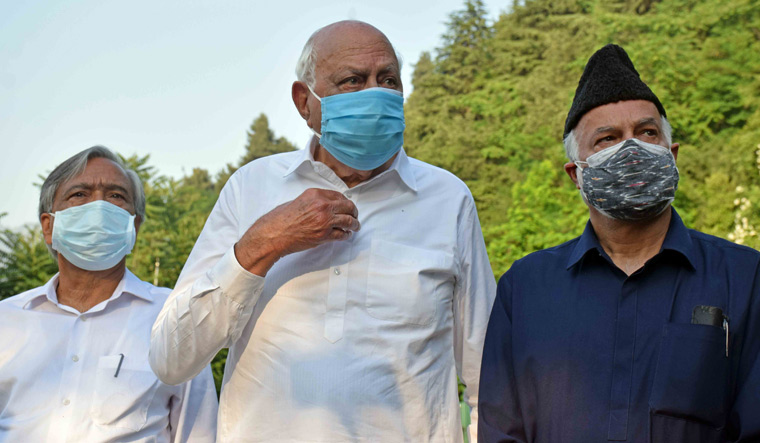There were great expectations from Prime Minister Narendra Modi’s meeting with mainstream politicians from Jammu and Kashmir on June 24. Modi had told the leaders that the government was keen on ending dil ke doori and dilli se doori (distance of the hearts and distance between J&K and Delhi). After giving them a patient hearing, he had promised that assembly polls would be held soon and statehood would be restored at an “appropriate time”.
Addressing the political vacuum in Jammu and Kashmir had been the BJP’s biggest challenge since August 2019, when Article 370 was voided and Jammu and Kashmir was divided into two Union territories. As the decision to strip Kashmir of its statehood and limited autonomy fuelled widespread anger, the party made several attempts to restore normalcy. It had first backed a new political outfit—the Apni Party, led by former minister and Peoples Democratic Party leader Altaf Bukhari. But when it failed to win mass support, the Centre held the first-ever elections to the district development council last year, hoping to create a new grassroots leadership and isolate rivals. But that plan, too, failed. The six-party Gupkar Alliance, which had been demanding statehood and special status, won 110 of 220 DDC seats.
Modi’s June meeting was, therefore, billed as a fresh start. But, in the absence of any follow-up moves from the government since, it has not had the desired result. In fact, the anger and frustration among leaders and supporters have only grown.
Several Kashmiri leaders said they had expected the Centre to take positive steps to ease the crisis—such as releasing political prisoners and ending the use of stringent laws like the Unlawful Activities (Prevention) Act to silence critics. “Kaun se doori khatam huva hain? (Which distance has been bridged),” asked Farooq Abdullah, former chief minister and president of the National Conference.
CPI(M) leader M.Y. Tarigami said Modi’s meeting had only increased the doori (distance) between Delhi and J&K. According to him, the continuing political killings in Kashmir belied the BJP’s claim of having restored peace in the Union territory. “Peace can be restored only by involving the people,” he said.
National Panthers Party leader Bhim Singh said Jammu and Kashmir was now like a colony of the BJP. “This is an RSS government,” he said. “Everybody knows what they want. They will hold elections only when it suits them.”
Though he has differences with the Gupkar Alliance, Bukhari, too, wants speedy elections. But he did not want to link elections to the statehood issue. “In the meeting with the prime minister, it was decided that elections would be held after delimitation is completed,” he said. “As for bridging the gap between J&K and New Delhi, the prime minister said it was his mission. We want the restoration of democracy at the earliest.”
The Gupkar Alliance wants the Centre to restore statehood before the polls. The Congress has supported the demand. During his recent two-day visit to Jammu and Kashmir, Congress leader Rahul Gandhi said his party had been unambiguous in its position that statehood must be restored and elections held in a free and fair manner. The demand for statehood was also raised in a virtual meeting of 19 opposition parties, including the PDP and NC, on August 20. Interestingly, the restoration of Article 370 was not discussed.
People’s Conference leader Sajjad Lone, who broke away from the Gupkar Alliance in January, suggested that the alliance was dithering about its stand regarding Article 370. “The BJP’s anti-Article 370 stance is clear,” he tweeted. “What is the national opposition’s stance?”
Lone has become politically stronger after quitting the Gupkar Alliance. Important leaders such as former NC minister Basharat Bukhari and former PDP leaders Safeena Baig, Nazir Laway and Mir Muhammad Fayaz have joined his party, which is influential in northern districts like Baramulla, Kupwara and Bandipora. Sources say the BJP is banking on Lone and Bukhari to form a coalition government after the polls. “The Gupkar Alliance and the Congress will not join hands with the BJP,” said an observer. “So Lone, Bukhari and a few others are the BJP’s only option to cobble together an alliance.”
The Gupkar Alliance does not have any party from Jammu. But the region has also been feeling politically and economically disempowered. Social activist Sunil Dimple alleged that the BJP misled the people on the issue of voiding of Article 370. “This is worse than British rule,” he said. “We feel like bonded labourers.”
The Covid-19 lockdown has made matters worse. Though restrictions on high-speed internet has been lifted, small businesses and startups are struggling to survive. Khalid Ahmed, who used to run a call centre in Srinagar, said most of the 30 registered call centres and business processing units in the IT sector have either shut down or shifted to Delhi because of the prolonged internet disruption.
“Before the internet was shut down, our business was booming and we had 40 employees,” said Ahmed. “We used to design websites with our US partners for Time Warner, and provide back-end support to Dish TV in Kashmir. [When the shutdown began] our partners suffered because of our inability to communicate with them and provide support. By the time the internet was restored, our business had folded.”
According to Dimple, people are losing jobs, businesses and land. “There are 30 lakh unemployed youth in J&K, and our resources are being offered to outsiders,” he said. “I doubt whether the BJP would hold elections since they have transferred the assembly secretariart staff.”


